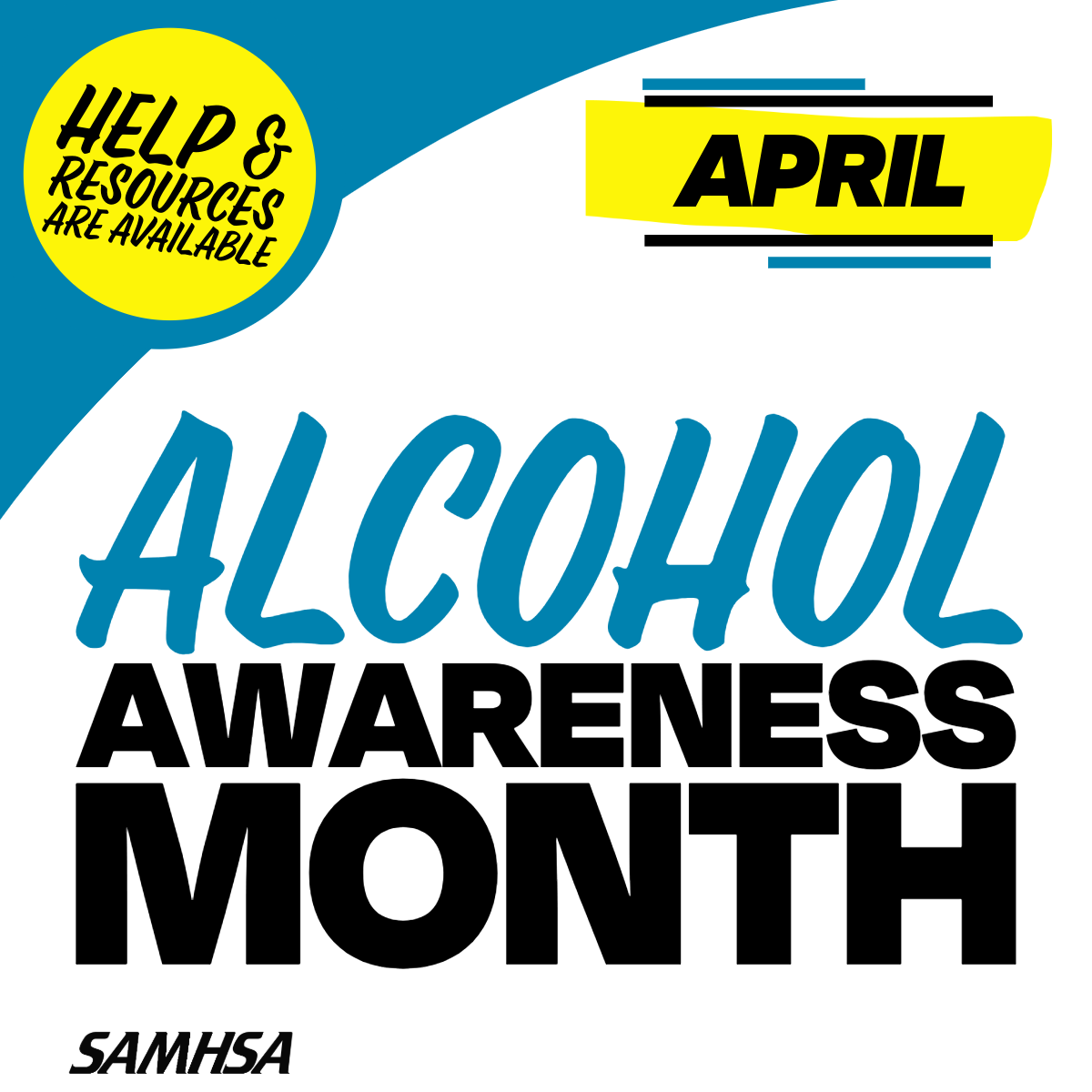Alcohol Awareness Month
April is Alcohol Awareness Month. Established in 1987 by the National Council on Alcoholism and Drug Dependence, it’s a pivotal time dedicated to increasing public understanding of alcohol-related issues, promoting responsible drinking habits, and supporting individuals struggling with alcohol use disorder (AUD). Also known as alcoholism, AUD is a chronic, relapsing disease characterized by persistent alcohol use that causes significant distress or impairment in daily life, despite adverse consequences. Alcohol Awareness Month continues to be recognized year after year in hopes of highlighting the causes and treatments of AUD while encouraging communities to engage in preventive education and treatment with an emphasis on recovery being available and attainable for anyone who needs it.
Understanding the prevalence and consequences of alcohol consumption is crucial to the cause. Per the 2023 National Survey on Drug Use and Health (NSDUH), approximately 28.9 million people had AUD in the past year. Alcohol-related problems continue to take a heavy toll on individuals, families, and communities. According to The National Institute on Alcohol Abuse and Alcoholism, researchers estimate that there are more than 178,000 alcohol-related deaths every year, making alcohol a leading preventable cause of death in the United States. In addition, alcohol misuse is the foundation for more than 200 disease and injury-related conditions.
Engaging in Alcohol Awareness Month can take various forms, whether it’s attending local events or supporting those who are struggling. It’s equally important to educate yourself and others on the signs of AUD. Here are common signs of drinking too much:
- Spending a lot of time drinking or thinking about alcohol
- Drinking more or longer than intended
- Continuing to drink even though it triggers depression, anxiety, or other health problems
- Having to drink more to achieve the desired effect
- The inability to cut down or stop drinking
- Others have made observations or comments about drinking habits
- Drinking interferes with daily activities, work, or relationships
- Legal problems due to drinking
- Withdrawal symptoms when not drinking – shakiness, sweating, tremors, headaches, irritability, insomnia
Raising awareness about alcoholism and AUD is vital since they are so often misunderstood. Because of societal stigma and misinformation, people often forget the very complex nature of addiction. Many people view this disease as a moral failing or a lack of willpower rather than recognizing it as a medical condition, which discourages open discussion and prevents those struggling from seeking help.
It’s important to remember that alcohol addiction is not a choice. People with AUD aren’t able to stop drinking because their brain chemistry has been altered. Medical and psychological support and treatment is necessary to overcome addiction for this very reason.
Another factor that complicates alcoholism is how normalized alcohol consumption is in many cultures. It is widely accepted and even used for celebratory gatherings. It’s not always necessarily a bad thing. However, the blurred line between social drinking, binge drinking, and alcoholism makes it harder to recognize problematic behavior which is why so many people downplay the severity of alcohol dependence.
Another misconception is that all alcoholics are at rock bottom. That is very far from the truth. Functioning alcoholics are able to participate in day-to-day life, maintaining jobs, relationships, and responsibilities while still being dependent on alcohol behind closed doors. Everyone struggles in their own unique way and it doesn’t always look like the stereotype we imagine.
Movies and television often depict alcoholics as reckless, violent, or hopeless, reinforcing negative stereotypes. In reality, AUD affects people from all walks of life and presents in various ways. Alcohol Use Disorder, as with most disorders, exists on a spectrum, from mild to severe. The assumption that only extreme cases involving blackouts or withdrawal symptoms qualify as “real” alcoholism, ignoring the dangers of less obvious but still harmful drinking habits. Psychological dependence, for example, can be just as powerful as physical reliance, making it difficult to quit even for those without extreme, visible withdrawal symptoms.
There are also genetic and psychological components to alcoholism that are significant in diagnosing treatment. Anxiety, depression, and trauma are all major contributors to AUD and many are more focused on the behavior instead of the underlying causes.
Clearing up these common misunderstandings can speed up recognition and intervention efforts, ultimately saving lives. Understanding the science of addiction encourages open conversations and fosters a compassionate approach to those struggling with alcohol dependence. The overarching goal is to foster an environment where individuals feel empowered to seek help without fear of judgment.
Support is available, and recovery is possible. If you or someone you know is struggling with alcohol use, it’s imperative to seek professional help. Numerous resources are available to provide support and guidance. The Substance Abuse and Mental Health Administration National Helpline – 1-800-662-HELP – is a confidential, free, 24/7 service for individuals coping with substance use disorders. Alcoholics Anonymous or community treatment centers are also readily available. At Hickory House Recovery, our team is available around the clock at 800-604-2117 for private, no-obligation consultations. Whatever questions you may have, we are here for you on your journey towards health and hope.

